
David Vickerman Bedford was an English composer and musician. He wrote and played both popular and classical music. He was the brother of the conductor Steuart Bedford, the grandson of the composer, painter and author Herbert Bedford and the composer Liza Lehmann, and the son of Leslie Bedford, an inventor, and Lesley Duff, a soprano opera singer.

Kevin Ayers was an English singer-songwriter who was active in the English psychedelic music movement. Ayers was a founding member of the psychedelic band Soft Machine in the mid-1960s, and was closely associated with the Canterbury scene. He recorded a series of albums as a solo artist and over the years worked with Brian Eno, Syd Barrett, Bridget St John, John Cale, Elton John, Robert Wyatt, Andy Summers, Mike Oldfield, Nico and Ollie Halsall, among others. After living for many years in Deià, Majorca, he returned to the United Kingdom in the mid-1990s before moving to the south of France. His last album, The Unfairground, was released in 2007. The British rock journalist Nick Kent wrote: "Kevin Ayers and Syd Barrett were the two most important people in British pop music. Everything that came after came from them."

June 1, 1974 is a live album of songs performed at the Rainbow Theatre in London on the titular date. The album is officially attributed to Kevin Ayers, John Cale, Brian Eno and Nico, although other well-known musicians, including Mike Oldfield, Robert Wyatt and Ollie Halsall, also contributed to the concert.
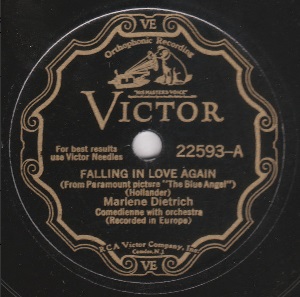
"Falling in Love Again " is the English language name for a 1930 German song composed by Friedrich Hollaender as "Ich bin von Kopf bis Fuß auf Liebe eingestellt". The song was originally performed, in the 1930 film Der Blaue Engel, by Marlene Dietrich, who also recorded the most famous English version, which became her anthem. Dietrich is backed by the Friedrich Hollaender Orchestra.

Joy of a Toy is the debut solo album of Kevin Ayers, a founding member of Soft Machine. Its whimsical and singular vision provides hints of how Soft Machine might have progressed had Ayers remained in the band. He is accompanied on the LP by pianist and arranger David Bedford as well as his erstwhile Soft Machine colleagues Robert Wyatt and Mike Ratledge, and his eventual replacement Hugh Hopper, who had previously worked with him in the semi-pro band Wilde Flowers. Among the session musicians are cellist and arranger Paul Buckmaster, jazz bassist Jeff Clyne, oboist Paul Minns and drummer Rob Tait.

The Unfairground is a 2007 album by Kevin Ayers, recorded with members of Ladybug Transistor, Teenage Fanclub, Neutral Milk Hotel, Gorky's Zygotic Mynci and Roxy Music. It was his sixteenth studio LP and his first new set of recordings in fifteen years, as well as the last album released before his death in 2013. It was recorded in New York City, Tucson, Arizona, London and Glasgow. It debuted at #14 in the UK Indie Album chart.

Shooting at the Moon is the second solo album of Kevin Ayers, on Harvest Records. David Ross Smith of AllMusic writes:
A snapshot of the era, the album is saturated with original ideas, experimentation, and lunacy, all powered by the bottled grape.

Bananamour is the fourth studio album by Kevin Ayers and it featured some of his most accessible recordings, including "Shouting in a Bucket Blues" and his whimsical tribute to Syd Barrett, "Oh! Wot A Dream". After Whatevershebringswesing, Ayers assembled a new band anchored by drummer Eddie Sparrow and bassist Archie Legget and employed a more direct lyricism. The centrepiece of the album is "Decadence", his withering portrait of Nico: "Watch her out there on display / Dancing in her sleepy way / While all her visions start to play / On the icicles of our decay / And all along the desert shore / She wanders further evermore / The only thing that's left to try / She says to live I have to die." The song was later covered by the Australian psychedelic rock band The Church on their 1999 album A Box of Birds.
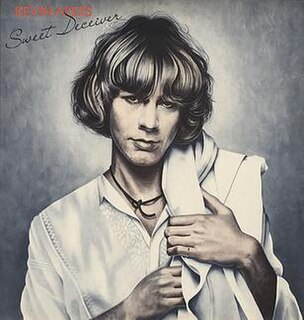
Sweet Deceiver is the sixth studio album by Kevin Ayers and his last for Island Records. It is one of Ayers’ more rock-oriented productions, with the first side featuring the progressive material, while the second was more mainstream. Guitarist Ollie Halsall was now a key foil for Ayers and his playing on the opening track “Observations” is a clear demonstration of his dexterity. Elton John also joined the sessions, contributing some outstanding piano work to several tracks, including “Circular Letter” and “Toujours Le Voyage”.
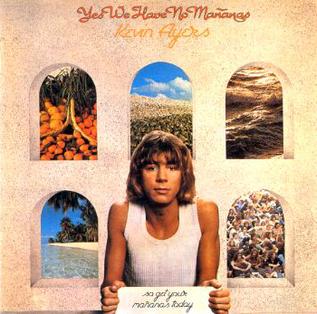
Yes We Have No Mañanas is the seventh studio album by Kevin Ayers, released in June 1976. This LP marked Kevin Ayers' return to the leftfield Harvest label. Producer Muff Winwood employed a straightforward pop production that clipped some of Ayers' usual eccentricities from the tapes.

That's What You Get Babe is the ninth studio album by Kevin Ayers and his final recording for Harvest.

Diamond Jack and the Queen of Pain is the tenth solo album by Kevin Ayers, a founding member of Soft Machine.

Deià...Vu is the eleventh studio album by Kevin Ayers, recorded in December 1980 and released in Spain after a remix in August 1984. It was recorded at Estudios Maller, Palma de Mallorca, with his local backing band led by Joan Bibiloni, and includes his musical partner Ollie Halsall. The title refers to the Spanish village Deià, Majorca.

"Love Makes Sweet Music" was the first single released by the psychedelic rock group Soft Machine. It is one of the first British psychedelic releases, predating Pink Floyd's "Arnold Layne" by a month. The [[A-side] is more pop-oriented, featuring Robert Wyatt on lead vocals. The other side, "Feelin’ Reelin Squeelin" is a disturbing tour de force with Kevin Ayers handling the lead vocal for the verses, while Wyatt sings the chorus; there is an elliptical series of strange noises and flute in the solo.

"Singing a Song in the Morning" was the first solo single released by Kevin Ayers, one of the founding members of the band Soft Machine. It was issued three months after Ayers' debut solo LP Joy of a Toy, and the artist was credited on the record label as Kevin Ayers and the Whole World. Although the song was not included on the original Joy of a Toy album, the single's b-side, "Eleanor's Cake ", was on the album.

"Butterfly Dance" was the second Kevin Ayers single. It was an exclusive release that did not appear on the contemporaneous album Shooting at the Moon. The flip side was a French-language version of the Ayers’ classic ‘May I?’.
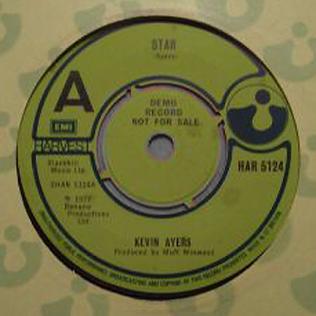
"Star" was the second Kevin Ayers single issued to promote his 1976 album, Yes We Have No Mañanas . Both songs were featured on the LP. Ayers would not release another single in the UK for three years.

"Who’s Still Crazy" is a Kevin Ayers Spanish single release taken from his 1983 album, Diamond Jack and the Queen of Pain. It is backed with his autobiographical ‘Champagne and Valium’, also lifted from the same LP.
Jazz pianist Thelonious Monk's first sessions as a bandleader were recorded between 1947 and 1952, and released on Blue Note records as a series of 78 RPM singles. These singles were then compiled in later years—with additional performances from the sessions—into long-playing album formats. As Monk's reputation and fame grew, the sessions were recompiled again and again into more complete configurations. This article details various releases of these sessions.
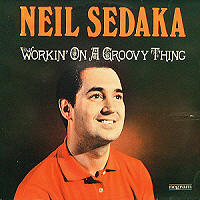
Workin' on a Groovy Thing is a 1969 studio album containing the works of American pop singer Neil Sedaka. The album was recorded while Sedaka was touring Australia in late 1969; he recorded it on a one-off basis for the Sydney, Australia-based label Festival Records; by that time his career had slumped, and his contract had not been renewed by his former label in the USA, RCA Victor. It was recorded in Festival's studios in Sydney, Australia. It was co-produced by Sedaka and Festival house producer Pat Aulton, with John Farrar taking care of the musical arrangements. The LP featured many notable Australian session players of the period including guitarist Jimmy Doyle and veteran jazz musician John Sangster.




















